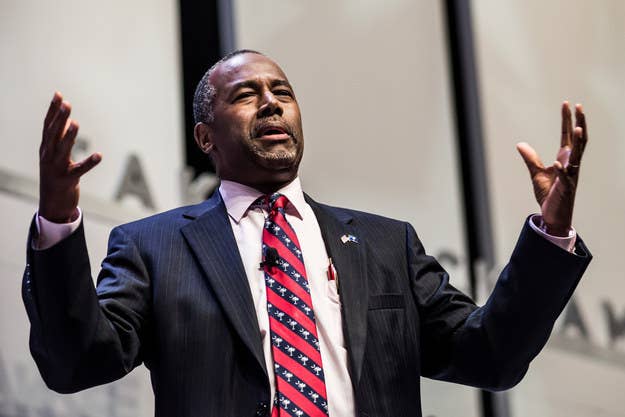
Republican presidential candidate Ben Carson has come under fire for saying that he would not support a Muslim for president, because he does not believe that Islam is "consistent with the Constitution."
In his 2011 book America the Beautiful, however, Carson repeatedly took a more inclusive approach -- and reminded readers that "there are 1.4 billion Muslims in the world and to paint them with a single philosophical brush is just as absurd as trying to characterize the diverse thinking of billions of Christians around the world."
The controversy around Carson began when the Republican told NBC's Chuck Todd that he "would not advocate that we put a Muslim in charge of this nation" during an interview on Meet the Press on Sunday.
On Monday, he reiterated his position, telling The Hill: "I do not believe Sharia is consistent with the Constitution of this country [...] Muslims feel that their religion is very much a part of your public life and what you do as a public official, and that's inconsistent with our principles and our Constitution."
But passages from Carson's 2011 book America the Beautiful express a more nuanced view of Islam, and argue that America's Founders were supportive of religion being "a part of your public life and what you do as a public official."
"Freedom of religion is one of the basic tenets of the founding of our nation, and while we are primarily a Judeo-Christian nation, we are a nation of faith that encompasses many religions and beliefs," Carson argues in the book's third chapter, "Are We A Judeo-Christian Nation or Not?"
"We as a nation welcome all nonviolent people of every faith, and there was never any intention by our founders of excluding religion from our public or private lives," Carson continues. "They did not want us to embrace a theocracy, but neither did they want us to eschew religious principles."
Elsewhere in the chapter, Carson explicitly rejects the idea that the Constitution sees no role for religion in the public sphere.
"I believe the problem arises from misinterpretation of what our founders intended with respect to government and religion," Carson writes. "They never wanted to see the government endorse a specific religion, but neither did they want to see faith and religion suppressed."
"There is nothing at all in our founding documents forbidding or denigrating religious expression in public life," Carson concludes.
In a later chapter, Carson tells the story of a dinner-party conversation with "an expert on Islamic culture."
"I was recently at a university-hosted dinner for a well-known expert on Islamic culture, and I asked him if it were possible for Islam and Christianity to peacefully coexist," wrote Carson. "It was clear that the question made him very uncomfortable, but he answered it honestly and said, unfortunately, it is not possible because some Islamists believe that Christians and Jews are infidels who should either be converted or at the very least avoided."
"It is very important to remember, however, that there are 1.4 billion Muslims in the world and to paint them with a single philosophical brush is just as absurd as trying to characterize the diverse thinking of billions of Christians around the world."
Still, Carson's book is not entirely uncritical of Islam.
"I have no problem with Muslims or other religious groups who want to practice their religion in their homes, which may be vastly different from traditional Judeo-Christian religion," he writes, "as long as they don't try to impose that on others or violate our laws."
Elsewhere, Carson suggests that "the real problem with Islam is its radical faction, which has grown dramatically in recent years," and acknowledges that "the vast majority of Muslims don't subscribe to this philosophy."
He complains, however, that this majority is "not very vocal, just as the vast majority of Germans did not subscribe to Hitler's insanity, but instead remained silent, paving the way for some of the most monstrous acts against humanity ever committed."
Ultimately, however, Carson's book departs significantly from his recent rhetoric.
"As a Christian, I am not the least bit offended by the beliefs of Hindus, Buddhists, Muslims, Jehovah's Witnesses, Mormons, and so forth," Carson writes. "In fact, I am delighted to know that they believe in something that is more likely to make them into a reasonable human being, as long as they don't allow the religion to be distorted by those seeking power and wealth."
"Those in positions of leadership in our society must familiarize themselves with the religions of all their citizens, and they must begin to emphasize the commonalities that unite us as people of faith," he concludes. "Common objectives placed on the forefront of public policies will help people work together and bond us together as a nation in spite of our religious differences."
